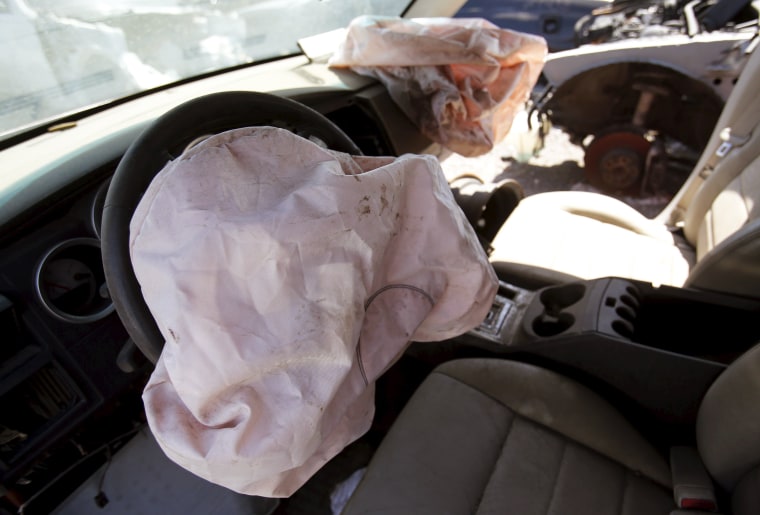In barely a month, more than 16 million vehicles using dangerously defective Takata airbags have been recalled, 4.4 million on Thursday alone. On top of the 24 million vehicles impacted by an earlier service action involving Takata, it’s the biggest recall in automotive history.
But it’s just one of the reasons why automotive safety recalls, in general, have hit record numbers two years in a row, with some observers worrying that 2016 could bring yet another all-time high. It’s not just that so many dangerous defects are being uncovered that worries safety advocates most, however, but the fact that as many as one in five vehicles on U.S. roads have at least one unrepaired problem covered by a recall.
“America does have a recall problem,” says Chris Basso, a spokesman for vehicle tracking service CarFax, “but it’s not the number of vehicles being recalled, but the number of vehicles that are not being fixed.”
According to CarFax data, about 47 million vehicles have not had recall problems corrected — up from 35 million as recently as 2014 — roughly 20 percent of those in operation in the U.S. That’s reflected by numbers from NHTSA. The National Highway Traffic Agency reports that, at best, only about 75 percent of the vehicles covered by any specific recall are likely to be fixed. And, in some cases, the completion rate dips below 40 percent.
Read More: New Count Finds 85M Unrecalled Takata Inflators in U.S. Vehicles
There are a number of reasons why. Fewer than 5 million out of the 24 million vehicles covered by the original Takata recall the government ordered last autumn have undergone repairs. In this case, the biggest problem is a lack of replacement parts, compounded by the fact that dealers are struggling to squeeze everyone into their overworked service departments. NHTSA has ordered a three-phase rollout of the new Takata recall in an attempt to ease the demand for replacement airbags.
The situation is so severe that some automakers are replacing old Takata airbags with similar but newer ones that will again need to be replaced once safer devices are available. Meanwhile, as Sen. Bill Nelson (D-Fla.) revealed this week, four automakers — Toyota, Fiat Chrysler, Volkswagen and Mitsubishi — continue building cars with faulty Takata airbags rather than shut down their assembly lines waiting for new parts.
“What’s troubling here is that consumers are buying new cars not realizing they’re going to be recalled,” said Sen. Nelson, following the release of a Senate Commerce Committee report on Wednesday.
Parts shortages have slowed other recent recalls, including one ordered to fix a defective General Motors ignition switch blamed for the deaths of at least 120 motorists over the past decade.
While some safety actions involve only a handful of vehicles, recalls, in general, have grown larger and larger over the years as automakers share parts and components in a bid to reduce costs. But when a defect is discovered, that can lead to severe delays.
Automakers and their suppliers don’t carry all the blame, however. Even when smaller recalls are announced, and parts made available, it can be a challenge getting cars fixed.
This week, the Rental Car Safety Act — inspired by the 2004 deaths of sisters Raechel and Jacqueline Houck — went into effect and now requires rental car companies to pull recalled vehicles out of their fleets until defects are fixed.
Similar efforts targeting car dealers have been stalled on Capitol Hill, however — though the nation’s largest new car retail chain, AutoNation, now voluntarily halts sales until vehicles on its lots are repaired.
Read More: Millions of Recalled Cars Roam the Road, Potentially Risking Lives
That could help increase the recall response rate, but consumers are often at fault for simply not responding when they get recall notices. “The bottom line is the small inconvenience of getting a recall fixed pales in comparison to what could happen because a vehicle hasn’t been fixed,” said CarFax’s Basso.
The company has launched a service, MyCarFax.com, that allows anyone to enter either the license plate number or Vehicle Identification Number (VIN) into its database. The site will not only advise if there’s an existing recall, but also send an alert if one is announced later on. Alternatively, motorists can search for existing recalls at the NHTSA website, SaferCar.gov, or at the website operated by individual manufacturers.
Automakers are under pressure from federal regulators to improve response rates. GM and Honda have gone so far as to offer owners incentives for responding to recent recalls. But part of the challenge is simply trying to find owners of older vehicles. The Takata airbag and GM ignition switch actions, for example, involved many models that have been in service for over a decade.
The likelihood grows that a defect and recall will go unrepaired “if you don’t catch a car before it goes out of warranty,” said Clarence Ditlow, head of the non-profit, Washington-based Center for Auto Safety. “When it gets to the third or fourth owner, it gets hard to find the owners and get the car fixed.”
Read More: Automakers Still Installing Defective Takata Airbags in Cars, Report Says
NHTSA is currently subsidizing efforts by several states meant to boost response rates by, in some cases, allowing them to withhold a registration until an owner gets a vehicle repaired. If these pilot programs prove effective, that approach might eventually be adopted across the country.
“The responsibility for the huge numbers of recalled cars lies squarely with the manufacturers and suppliers, who concealed defective, unsafe products,” not consumers, said Rosemary Shahan, an advocate with the California-based Consumers for Auto Reliability and Safety.
And she calls on Congress to provide more funding to NHTSA to crack down on the industry and find problems sooner.
But however blame is apportioned, there is little doubt that there is a growing recall problem that needs to be addressed to ensure the safety of American motorists.
